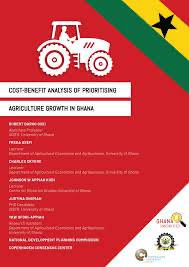Why Ghana Should Prioritize Agriculture Now
Ghana, a nation endowed with rich natural resources and fertile land, has historically relied on agriculture as a cornerstone of its economy. Despite the rapid urbanization and industrialization seen in recent years, it is imperative that Ghana revisits and prioritizes its agricultural sector. This focus is not merely about economic growth; it is essential for food security, job creation, sustainable development, and environmental stewardship.
Economic Significance
Agriculture has long been a significant contributor to Ghana’s GDP, accounting for about 20% of it and employing over 40% of the workforce. By prioritizing agriculture, Ghana can harness this sector's potential to drive economic growth. Increasing investment in agriculture can lead to enhanced productivity through the adoption of modern farming techniques and technologies. This, in turn, would not only increase the output but also enhance the quality of produce, making Ghanaian products more competitive in international markets.
Additionally, diversifying agricultural production can reduce Ghana’s dependency on a few cash crops, such as cocoa. By promoting the cultivation of a broader range of crops, including fruits, vegetables, and grains, the country can mitigate risks associated with price fluctuations and climate change. The development of agro-processing industries can further add value to raw agricultural products, boosting economic resilience and creating jobs.
Food Security
Food security remains a critical issue in Ghana. While the country has made strides in increasing food production, challenges such as land degradation, inadequate infrastructure, and climate change threaten to undermine these gains. A focused agricultural strategy can enhance food security by promoting sustainable practices that ensure a reliable food supply. Investments in irrigation, for example, can help farmers maintain productivity even during dry seasons.
Moreover, enhancing local food production can reduce reliance on imports, which have become increasingly costly. Strengthening local supply chains not only contributes to food security but also supports local economies, keeping financial resources within communities.
Job Creation
With unemployment and underemployment prevalent, particularly among the youth, prioritizing agriculture presents a viable pathway to job creation. The agricultural sector has the potential to absorb a significant portion of the workforce, particularly if youth are encouraged to engage in farming and agribusiness. By integrating modern technology and innovative practices into agriculture, young people can find lucrative opportunities that transform the sector.
Education and training programs focused on agricultural entrepreneurship can empower the youth, equipping them with the skills needed to thrive in this vital industry. Additionally, promoting agribusiness can inspire a new generation of farmers who leverage technology and sustainable practices, further invigorating the sector.
Sustainable Development
The environmental impact of agriculture is increasingly under scrutiny, and Ghana must adopt sustainable practices to safeguard its natural resources. By prioritizing sustainable agricultural practices, Ghana can address issues such as soil erosion, deforestation, and water scarcity. Emphasizing organic farming, agroforestry, and permaculture can enhance biodiversity and improve soil health, ensuring that future generations inherit a viable environment.
Furthermore, aligning agricultural practices with climate resilience is crucial. As climate change continues to pose threats, investing in research and development for climate-smart agricultural techniques will enable farmers to adapt and thrive under changing conditions. This proactive approach can help protect food systems and livelihoods.
Global Trends and Opportunities
In a global context, the demand for sustainable and organic food products is rising. Ghana has the opportunity to tap into these markets by positioning itself as a supplier of high-quality, sustainably produced agricultural goods. By focusing on export-oriented agriculture, the country can diversify its economy and create a robust export base that attracts foreign investment.
Moreover, as countries increasingly seek to establish food sovereignty and sustainability, Ghana can become a leader in sustainable agricultural practices within the region. Collaborating with international organizations and research institutions can facilitate knowledge exchange and access to innovative farming technologies.
Conclusion
The time is ripe for Ghana to prioritize agriculture as a strategic pillar for national development. By investing in this sector, the country can bolster its economy, enhance food security, create jobs, and promote sustainable practices. With a clear focus on modernizing agriculture and embracing sustainable methodologies, Ghana can ensure that its agricultural sector remains vibrant and resilient in the face of evolving challenges. The benefits are manifold and far-reaching, underscoring the necessity of placing agriculture at the forefront of national priorities. In doing so, Ghana can pave the way for a prosperous and sustainable future for all its citizens.




No comments yet
Be the first to share your thoughts!